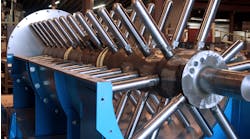The Hydraulic Institute (HI) develops the PSAP certification program to provide pump end-users and other stakeholders with a means to assess complicated systems with highly qualified, certified pump system assessors. The certification program will reportedly set the standard for the knowledge, skills, and abilities necessary for performing pump system assessments and utilizing pump system optimization techniques.
“The PSAP program addresses a key market need in the industrial and commercial marketplace,” says Michael Michaud, executive director, Hydraulic Institute. “Energy and maintenance costs combine to represent some 65% of the total cost of ownership of a medium sized industrial pumping system. A thorough system assessment often identifies energy efficient upgrade opportunities that usually pay for themselves in less than a year, lowering overall energy costs while increasing reliability, reducing downtime and maintenance costs. The key to unlocking the savings starts with a holistic assessment from a professional who can assess and optimize the overall system.”
Corporations gain a competitive edge by employing PSAPs and performing more pump system assessments, according to HI. For corporations, the PSAP program reportedly:
- Increases the value of corporate capabilities.
- Validates employee knowledge and experience by the pump industry authority.
- Ensures the highest level of system assessments are being performed.
According to Edgar Suarez, technical program manager, Hydraulic Institute, “PSAPs are professionals who distinguish themselves as true experts in assessing all types of pumping systems. Examining system interactions means looking beyond the individual components to identify inefficiencies. Flow requirements are often overstated when specified and components can be oversized to ensure requirements are met. These inefficiencies add up to a lot of potential waste in a system and create opportunities not only to improve the overall system performance, but lower maintenance costs and increase uptime and overall system reliability.”
By pursuing the PSAP, individuals can advance their career and become a stronger asset to their organization. For certified individuals, the PSAP program:
- Assures organization and/or clients that the certified individual has the required knowledge and skills to perform a comprehensive pump system assessment.
- Validates field expertise and aligns knowledge with industry best practices.
- Enhances career opportunities and a commitment to continuous learning.
Applicants must have a minimum of three years of pump/pumping system experience and possess an undergraduate degree from an accredited university or college in a technical/business field. Applicants may also possess five or more years of direct industrial or commercial fluid transfer/pumping systems experience having completed a minimum of seven pump system assessments. After an application is accepted by HI, candidates sit for a 3½ hour proctored exam.
For more information, visit www.pumps.org/psap

